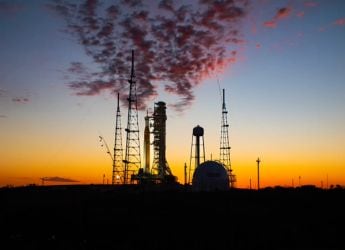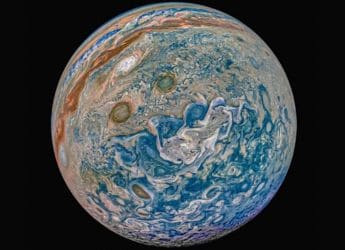- Home
- Science
- Science News
- NASA Confirms Existence of More Than 5,000 Exoplanets Beyond Our Solar System
NASA Confirms Existence of More Than 5,000 Exoplanets Beyond Our Solar System
More exoplanets are likely to be discovered soon as our galaxy, the Milky Way, likely holds hundreds of billions of planets that are yet to be found.

Photo Credit: NASA/ DSCOVR EPIC
NASA said that the exoplanets include small, rocky worlds like Earth and “super Earths”
In a major milestone for astronomy, NASA has confirmed the existence of a massive 5,000 planets beyond our own solar system. Not so long ago, we only knew a handful of planets that revolved around our Sun, but the quest to know the world beyond always continued. NASA has now added a fresh batch of 65 planets outside our immediate solar family to its exoplanet archive, pushing the total beyond the 5,000 mark — after a 30-year journey of astronomical discoveries. The NASA Exoplanet Archive records discoveries that have been confirmed using multiple detection methods.
NASA has said that these exoplanets include small, rocky worlds like Earth and “super Earths” which are larger than our own. There are also gas giants several larger than Jupiter and “mini-Neptunes.” Some of these planets orbit two stars at once and others stubbornly revolve around the collapsed remnants of dead stars.
“It's not just a number,” said Jessie Christiansen, science lead for the archive and a research scientist with the NASA Exoplanet Science Institute at Caltech in Pasadena. “Each one of them is a new world, a brand-new planet. I get excited about everyone because we don't know anything about them.”
Our galaxy, the Milky Way, likely holds hundreds of billions of planets. Initially, we were able to locate only those planets that surrounded our Sun. Then, in 1992, scientists began to detect strange new worlds using powerful observatories. The first of them was a type of neutron star known as a pulsar. Studying the pulses emitted by the pulsar, scientists revealed planets in orbit around it.
Alexander Wolszczan, the lead author on the paper that, 30 years ago, unveiled the first planets to be confirmed outside our solar system, said at the time, “If you can find planets around a neutron star, planets have to be basically everywhere.”
Scientists now hope that newer telescopes like the James Webb and their highly sensitive instruments will now allow them to rapidly expand their exoplanet research. Several other telescopes are also in the pipeline to be launched, including the Nancy Grace Roman Space Telescope, expected to launch in 2027, and European Space Agency's ARIEL mission, launching in 2029.
Get your daily dose of tech news, reviews, and insights, in under 80 characters on Gadgets 360 Turbo. Connect with fellow tech lovers on our Forum. Follow us on X, Facebook, WhatsApp, Threads and Google News for instant updates. Catch all the action on our YouTube channel.
Related Stories
- Samsung Galaxy Unpacked 2026
- iPhone 17 Pro Max
- ChatGPT
- iOS 26
- Laptop Under 50000
- Smartwatch Under 10000
- Apple Vision Pro
- Oneplus 12
- OnePlus Nord CE 3 Lite 5G
- iPhone 13
- Xiaomi 14 Pro
- Oppo Find N3
- Tecno Spark Go (2023)
- Realme V30
- Best Phones Under 25000
- Samsung Galaxy S24 Series
- Cryptocurrency
- iQoo 12
- Samsung Galaxy S24 Ultra
- Giottus
- Samsung Galaxy Z Flip 5
- Apple 'Scary Fast'
- Housefull 5
- GoPro Hero 12 Black Review
- Invincible Season 2
- JioGlass
- HD Ready TV
- Latest Mobile Phones
- Compare Phones
- Tecno Pova Curve 2 5G
- Lava Yuva Star 3
- Honor X6d
- OPPO K14x 5G
- Samsung Galaxy F70e 5G
- iQOO 15 Ultra
- OPPO A6v 5G
- OPPO A6i+ 5G
- Asus Vivobook 16 (M1605NAQ)
- Asus Vivobook 15 (2026)
- Brave Ark 2-in-1
- Black Shark Gaming Tablet
- boAt Chrome Iris
- HMD Watch P1
- Haier H5E Series
- Acerpure Nitro Z Series 100-inch QLED TV
- Asus ROG Ally
- Nintendo Switch Lite
- Haier 1.6 Ton 5 Star Inverter Split AC (HSU19G-MZAID5BN-INV)
- Haier 1.6 Ton 5 Star Inverter Split AC (HSU19G-MZAIM5BN-INV)







![[Partner Content] OPPO Reno15 Series: AI Portrait Camera, Popout and First Compact Reno](https://www.gadgets360.com/static/mobile/images/spacer.png)









